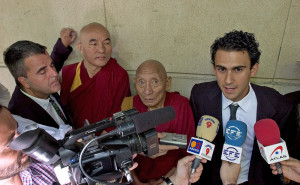
(From left to right) Alan Cantos, Director of Comite de Apoyo al Tibet (CAT) and international coordinator of the Tibet case in the Spanish court, Thubten Wangchen, Tibetan Parliamentarian and plaintiff in the Tibet law suits, Palden Gyatso, who bore witness in the cases following 33 years in prisons and labor camps in Tibet, and Jose Elias Esteve Molto, international lawyer, Tibet legal expert and main lawyer who researched and drafted the Tibet case in the Spanish court.
The unexpected development follows intense judicial discussions behind the scenes in the Madrid National Court (Audiencia Nacional) about how to proceed since appeal judges ruled that the warrants should be issued in November 2013 (ICT report, Spanish criminal court orders arrest warrants against Chinese leaders following Hu Jintao indictment for Tibet policies).
Reuters reported that Judge Moreno, citing lawyers for the Tibetan plaintiffs, wrote in the order today: “Jiang Zemin exercised supervisory authority over the people who directly committed abuses, which makes him responsible for acts of torture and other major abuses of human rights perpetrated by his subordinates against the people of Tibet.” (Reuters, February 10, 2014).
Spanish lawyers working on the lawsuits against the Chinese leaders said that the new move by Judge Ismael Moreno was evidence that the case will now progress, even though the ruling is against the wishes of the Spanish government, under pressure from the Chinese leadership. Today’s development sends a strong signal to the Spanish government about the independence of the judiciary, as well as to the Chinese leadership.
José Elías Esteve Moltó, main research lawyer and author of both cases, and Alan Cantos from Comite de Apoyo Al Tibet (CAT) in Madrid, Spain’s Tibet Support Committee, which has pioneered the two Tibet lawsuits, said: “Judge Moreno’s ruling today means we have kept our promise to the Tibetan victims and their families that we would not rest until those most responsible for the brutal repression in Tibet was brought before the law. We hope that the warrants of arrest of the other five defendants will serve to help the international community distinguish the red lines that should never have been crossed in international politics with respect to Tibet and China. Above the complicity with economic and geopolitical interests there will always be the truth, justice and human rights. We trust that this fight against impunity will benefit the Tibetan people and all the Chinese citizens persecuted by a government they did not choose.”
Alan Cantos from Comite de Apoyo Al Tibet (CAT) also said: “This is an important victory for Tibetans and highlights the shameful attempts by the Spanish government to amend the law that will be discussed in Parliament tomorrow. I hope it will inspire lawyers and victims to seek justice through other national courts in strong countries with solid democracies.”
There has been intense debate in Spain over the Spanish government’s move to limit universal jurisdiction, which could lead to the Spanish government invoking reasons of “general interest” to prevent judges from investigating crimes of genocide committed abroad, although the principle of universal jurisdiction is the recognition that human rights abuses and crimes against humanity transcend national borders and nationality of victims. In Spain, senior lawyers, human rights activists, international law professors and others have expressed dismay at the response to China’s aggressive lobbying of the Spanish government to shut down the cases focusing on Chinese leaders.
The orders for arrest warrants are made against five senior Chinese leaders for their involvement in policies in Tibet as follows: Jiang Zemin, former President and Party Secretary; Li Peng, Prime Minister during the repression in Tibet in the late 1980s and early 1990s (and the crackdown in Tiananmen); Qiao Shi, former head of Chinese security and responsible for the People¹s Armed Police during the martial law period in Tibet in the late 1980s; Chen Kuiyuan, Party secretary in the Tibet Autonomous Region from 1992 to 2000 (who was known for his hardline position against Tibetan religion and culture), and Peng Peiyun, minister of family planning in the 1990s.
Last week, it was not clear whether Judge Moreno would act before proposed reforms that limit universal jurisdiction are approved and activated. (El Pais, El juez Moreno ordenará el arresto del expresidente chino Jiang Zemin – February 6, 2014 and ICT report, A ‘death blow to democracy’: Spanish lawyers challenge new ruling that may close down Tibet lawsuits after Chinese pressure).
One of the key criminal lawyers in the case, Prof. Dr. Manuel Ollé Sesé, said the reforms to be voted upon in Parliament in Madrid tomorrow (February 11) would be “a death blow to the separation of powers in a democracy (judicial and state), to propose that Government decides what cases can be accepted or not […] The government wants to make himself plaintiff, prosecutor and judge and that is how democracy ends.”

